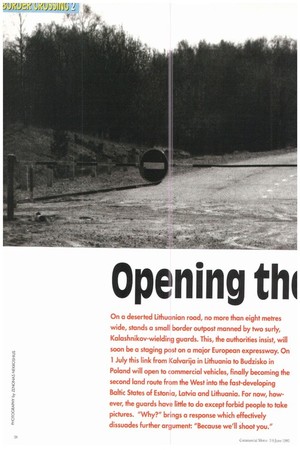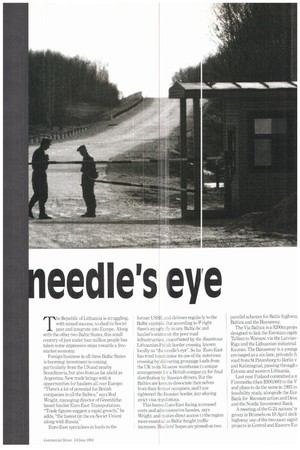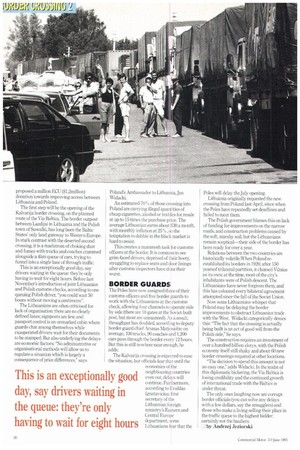Opening till
Page 30

Page 31

Page 32

If you've noticed an error in this article please click here to report it so we can fix it.
eedle's eve
The Republic of Lithuania is struggling, with mixed success, to shed its Soviet past and integrate into Europe. Along with the other two Baltic States, this small country of just under four million people has taken some impressive steps towards a freemarket economy
Foreign business in all three Baltic States is booming: investment is coming particularly from the US and nearby Scandinavia, but also from as far afield as Argentina. New trade brings with it oppornmities for hauliers all over Europe: "There's a lot of potential for British companies in all the Baltic's," says Rod Wright, managing director of Greenhithebased haulier Eum-East Transportation. "Trade figures suggest a rapid growth," he adds, "the fastest (in the ex-Soviet Union) along with Russia."
Euro-East specialises in loads to the
former USSR. and delivers regulai ly to the Baltic capitals. But according to V right there's an ugly ily in any Baltic-bc and haulier's ointment: the poor road infrastructure. exacerbated by tht disastrous Lithuanian-Pollsh border crossing known locally as "the needle's eye". So fat Euro-East has tried to minimise its use of thc notorious crossing by delivering groupagebiads from the UK to its Moscow warehouse (a unique arrangement for a British compar y), for final distribution by Russian drivers. But the Baltics are keen to dissociate themselves from their former occupiers, and 1ave tightened the Russian border, introducing strict visa regulations.
This leaves Euro-East facing increased costs and admiiiistrative hassles, says Wright and makes direct access t7) the region more essential as Baltic freight traffic increases. Hauliers' hopes are pinned on two parallel schemes for Baltic highwal Baltica and the Hansaway.
The Via Baltica is a S2(X)m projec designed to link the Estonian capitr Tallinn to Warsaw, via the Latvian . Riga and the Lithuanian industrial Kaunas. The Hansaway is a yotmgi envisaged as a six-lane, privately ft road from St Petersburg to Berlin v and Kaliningrad, passing through Estonia and western Lithuania.
Last year Finland committed a it Finnmarks (then $200,000) to the V and plans to do the same in 1993 to feasibility study, alongside the Eur Bank for Reconstruction and Deve and the Nordic Investment Bank.
A meeting of the G-24 nations tr group in Brussels on 19 April declr highway one of the two most signii projects in Central and Eastern Eut proposed a million ECU (S1.2million) donation towards improving access between Lithuania and Poland.
The first step will be the opening of the Kalv-arija border crossing, on the planned route of the Via Baltica. The border outpost between Lazdijai in Lithuania and the Polish town of Suwalki, has long been the Baltic States' only land gateway to Western Europe. In stark contrast with the deserted second crossing, it is a maelstrom of choking dust and fumes with trucks and coaches crammed alongside a 4km queue of cars, trying to funnel into a single lane of through traffic.
This is an exceptionally good day, say drivers waiting in the queue: they're only having to wait for eight hours. Before last November's introduction of joint Lithuanian and Polish customs checks, according to one queuing Polish driver, you could wait 50 hours without moving a centimetre".
The Lithuanians are often criticised for lack of organisation: there are no clearly defined lanes; signposts are few, and passport control is an unmarked cabin where guards chat among themselves while exasperated drivers wait for their documents to be stamped. But also underlying the delays are economic factors: "No administrative or organisational methods will allow us to regulate a situation which is largely a consequence of price differences." says Poland's Ambassador to Lithuania, Jan Widacki.
An estimated 70% of those crossing into Poland are carrying illegal quantities of cheap cigarettes, alcohol or textiles for resale at up to 15 times the purchase price. The average Lithuanian earns about S30 a month, with monthly inflation at 25%, so the temptation to dabble in the black market is hard to resist.
This creates a mammoth task for customs officers at the border. It is common to see grim-faced drivers, deprived of their booty, struggling to replace seats and door linings after customs inspectors have done their worst.
BORDER GUARDS
The Poles have now assigned three of their customs officers and five border guards to work with the Lithuanians at the customs check, allowing four channels to operate side by side (there are 10 gates at the Soviet-built post, but most are unmanned). As a result, throughput has doubled, according to deputy border guard chief Arunas Matjosaitis: on average, 100 trucks, 90 coaches and 1200, cars pass through the border every 12 hours, But this is still nowhere near enough, he adds, The Kalvarija crossing is expected to ease the situation, but officials fear that until the economies of the neighbouring countries even out, delays will continue. Furthermore, according to Evaldas Ignatavicius, first secretary of the Lithuanian foreign ministry's Eastern and Central Europe department, some Lithuanians fear that the Poles will delay the July opening.
Lithuania originally requested the new crossing from Poland last April, since when the Poles have repeatedly set deadlines and failed to meet them.
The Polish government blames this on lack of funding for improvements on the narrow roads, and construction problems caused by the soft, marshy soil, but the Lithuanians remain sceptical—their side of the border has been ready for over a year.
Relations between the two countries are historically volatile.When Poland reestablished its borders in 1920, after 150 yearsof trilateral partition, it claimed Vilnius as its own: at the time, most of the city's inhabitants were of Polish descent. The Lithuanians have never forgiven them, and this has coloured every bilateral agreement attempted since the fall of the Soviet Union.
Now some Lithuanians whisper that Poland may be delaying the border improvements to obstruct Lithuanian trade with the West. Widacki categorically denies this: "The fact that the crossing is actually being built is an act of good will from the Polish side," he says.
The construction requires an investment of over a hundred billion zlotys, with the Polish economy itself still shaky and about 60 new border crossings required at other locations.
"The decision to spend this amount is not an easy one," adds Widacki. In the midst of this diplomatic bickering, the Via Ba Rica is losing credibility and the continued growth of international trade with the Baltics is under threat.
The only ones laughing now are corrupt border officials (you can solve any delays with a few dollars, say the smugglers) and those who make a living selling their place in the traffic queue to the highest bidder: certainly not the hauliers.
A by Andrzej Jeziorski




















































































